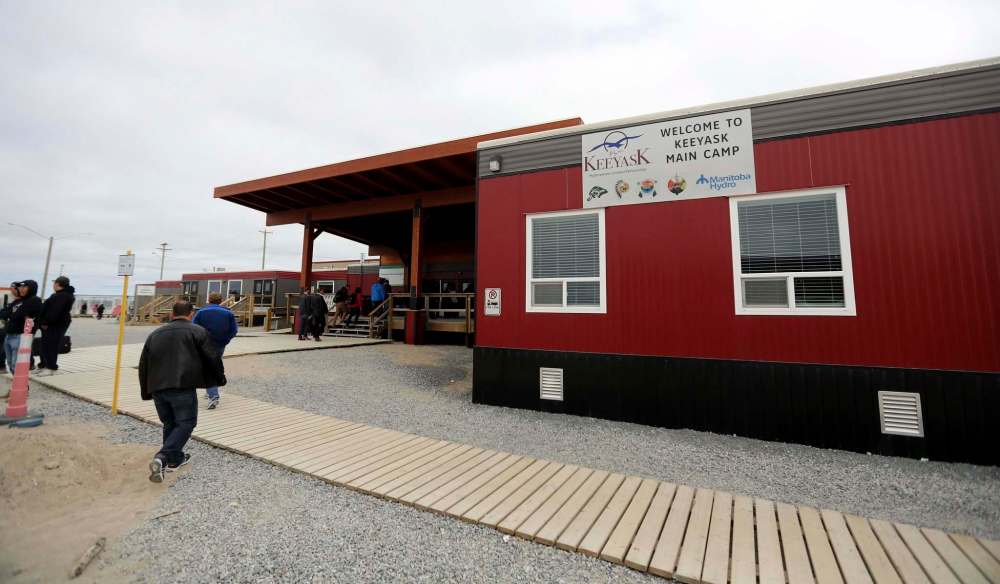RCMP ‘looking into’ abuse allegations
Devastating, ongoing social ills result of Hydro project, York Factory chief charges
Advertisement
Read this article for free:
or
Already have an account? Log in here »
To continue reading, please subscribe:
Monthly Digital Subscription
$0 for the first 4 weeks*
- Enjoy unlimited reading on winnipegfreepress.com
- Read the E-Edition, our digital replica newspaper
- Access News Break, our award-winning app
- Play interactive puzzles
*No charge for 4 weeks then price increases to the regular rate of $19.00 plus GST every four weeks. Offer available to new and qualified returning subscribers only. Cancel any time.
Monthly Digital Subscription
$4.75/week*
- Enjoy unlimited reading on winnipegfreepress.com
- Read the E-Edition, our digital replica newspaper
- Access News Break, our award-winning app
- Play interactive puzzles
*Billed as $19 plus GST every four weeks. Cancel any time.
To continue reading, please subscribe:
Add Free Press access to your Brandon Sun subscription for only an additional
$1 for the first 4 weeks*
*Your next subscription payment will increase by $1.00 and you will be charged $16.99 plus GST for four weeks. After four weeks, your payment will increase to $23.99 plus GST every four weeks.
Read unlimited articles for free today:
or
Already have an account? Log in here »
Hey there, time traveller!
This article was published 01/09/2018 (2658 days ago), so information in it may no longer be current.
Ten days after the province dropped a bombshell report containing testimony of historical abuse in northern Indigenous communities, another First Nations leader has come forward with allegations against Manitoba Hydro workers.
The chief of York Factory First Nation says workers from the Keeyask generating station construction site have sexually assaulted women, used racial slurs, and introduced cocaine to northern Manitoba communities.
In a two-page statement sent to the Free Press, Chief Leroy Constant outlined disturbing concerns surrounding the Hydro megaproject, located about 725 kilometres north of Winnipeg on the lower Nelson River.

Hydro began construction on Keeyask in July 2014, and work is ongoing. More than 3,000 employees from around the world are involved, as are four First Nations partners: York Factory, Tataskweyak Cree Nation, War Lake First Nation and Fox Lake Cree Nation. The chiefs of Fox Lake and War Lake have previously gone on the record with their concerns about the alleged actions of Keeyask workers, and the work environment at the site.
“As chief of York Factory First Nation, I want to be clear that racism, harassment, drug and alcohol addiction are continuing issues for our members at Keeyask,” Constant wrote this week.
“YFFN has been hearing stories of traumatic sexual violence and assaults from our members and other Indigenous workers involved at Keeyask, from the beginning of the project until as recently as within the past month.”
Constant acknowledged there is work being done to address the issues he mentioned, including efforts with Hydro, RCMP and other service providers to improve responses.
In an email Friday, RCMP said they are looking into the allegations about sexual violence brought up by York Factory. Spokesman Robert Cyrenne noted the Gillam and Thompson rural detachments cover large areas that encompass many communities, including those with workers at Keeyask.
RCMP are also part of a Keeyask worker interaction subcommittee comprised of Hydro officials, members of Fox Lake Cree Nation, the Town of Gillam and Gillam Hospital, he said, adding their last subcommittee meeting was in April.
“Gillam RCMP officers are in regular contact with Manitoba Hydro for issues surrounding the Keeyask worksite and hydroelectric development as well as with leaders of surrounding First Nations to discuss safety and security issues affecting their communities,” Cyrenne said.
On Thursday, the Free Press asked Hydro for comment on York Factory’s allegations and spokesman Scott Powell offered a brief email statement.
“These are serious allegations that we are going to address directly with our partner First Nation communities. No further comments will be issued on this matter,” he said.
After conducting a workplace culture assessment in late 2016, D. Carriere & Associates offered 64 recommendations to improve life at Keeyask, including reviewing its drug and alcohol policy. The suggestions were sent to Hydro in June 2017.
Hydro previously said it completed 63 of the 64 suggestions and the last one — mandatory conflict-resolution training for managers — is underway.
Hydro said it wouldn’t rejig its drug-and-alcohol policy, which mandates anyone caught intoxicated on site or possessing drugs or alcohol be suspended from work for one year. It wouldn’t budge as “the potential consequences of reporting to work in an unfit condition are serious,” spokesman Bruce Owen told the Free Press earlier this week.
In the spring, York Factory members approached the board of the Keeyask Hydropower Limited Partnership about an increased presence of drugs and alcohol in the community, Constant said.
“Cocaine has arrived since the beginning of the project, some members have developed addictions at the worksite, and problems at the community level have been aggravated,” the chief stated.
In written testimony provided to the Clean Environment Commission (CEC) in October 2017, another community member acknowledged the cocaine problem.
“One community effect I notice ever since Keeyask went up: there’s been more drugs in the community. There’s now cocaine in our community. That’s one effect that I’ve noticed from Keeyask,” said Silas Ryle of York Factory.
In its written submission to the CEC, the First Nation likened northern hydroelectric development in Manitoba to “part of the colonial legacy, and (it) needs to be recognized as such.”

“It should stand alongside the residential school system, the ’60s Scoop, and missing and murdered Indigenous women, as one of the foremost issues in Manitoba’s reconciliation dialogue,” the statement reads.
Constant said York Factory members have been working on Hydro projects in their territory since the late 1950s, often facing discrimination in the workplace.
“For many, this racial violence is a continuation of racism and assault that they experienced at hydro work camps over the last 50 years. Sadly, there are now three generations of our members who can relate to the incidents that have been in the media this last week,” he said.
On Aug. 21, the province released a CEC report dated May 2018, which detailed Hydro’s historical impact on northern communities with input from more than a dozen groups.
Members of Fox Lake Cree Nation provided testimony regarding sexual assaults, racism and discrimination involving Hydro workers that affected their community dating back to the 1960s. The allegations are being looked at by police.
The CEC report is only the latest document to outline major concerns raised by First Nations about Hydro. The Interchurch Council on Hydropower held hearings about the power utility’s impact in the North in 1999 and presented its findings to government in 2001.
Hydro received an environmental evaluation report from Fox Lake in 2012 detailing “social tension” since the company’s arrival.
“Many reported incidences of racism and discrimination in their work, school and community lives, including involvement with the RCMP. There were incidences of violence and crimes, including rapes and sexual assaults. Our people typically list the impact of the influx of workers, and the resulting toxic social environment in the town of Gillam, as the main socio-economic impact resulting from hydroelectric development,” the 2012 report stated.
Constant said interviews are currently being conducted with members of the First Nations communities involved at Keeyask to understand the project’s impact on workers and families. The interviewees are raising many of the same issues addressed in Keeyask’s 2017 workplace culture assessment, including being on the receiving end of racist comments, and some of their complaints “are not being dealt with satisfactorily,” he said.
“One member was called a ‘dirty Indian’ while serving in the cafeteria. She reported the incident but there were no consequences for the offenders,” Constant said. “There have been other incidents of graffiti at camp with language like: ‘F—ing Natives’ or ‘If I don’t get home soon, I’m going to f— a Sodexo Pig’ (referring to Indigenous women)… Site staff have not been able to determine who wrote these statements.
“We are hearing again about family separation and stress related to the work schedule of 21 days on the job and just seven days off the job,” the chief said. “Stresses at the worksite are reflected back in our community of York Landing.”
More than 460 people live on reserve, and there are 1,435 members of York Factory First Nation. More than 100 members of York Factory are working at Keeyask, Constant said, noting the number fluctuates.
jessica.botelho@freepress.mb.caTwitter: @_jessbu
History
Updated on Saturday, September 1, 2018 7:42 AM CDT: Final





